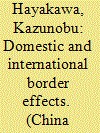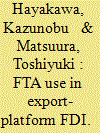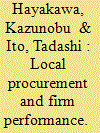| Srl | Item |
| 1 |
ID:
159036


|
|
|
|
|
| Summary/Abstract |
Previous studies in the border-effect literature surprisingly found that domestic border effects are larger than international border effects (e.g., in the United States or Brazil). One interpretation of this result is that these estimates include the effects of producer agglomeration. Therefore, in this study, we estimate those border effects exclusively for transactions for final consumption, in which such agglomeration forces will be weak, in China and Japan. As a result, we found larger international border effects and could not find a significant role for producer agglomeration in the estimates of border effects. We also found that China's accession to the World Trade Organization reduces border effects in trading between China and Japan but does not decrease domestic border effects.
|
|
|
|
|
|
|
|
|
|
|
|
|
|
|
|
| 2 |
ID:
154532


|
|
|
|
|
| Summary/Abstract |
Multinational enterprises (MNEs) actively use overseas affiliates to trade with third countries (i.e., neither the home country nor host country). In this paper, we empirically identify significant firm characteristics that influence the use of FTAs in export-platform Foreign Direct Investment (FDI). Specifically, we investigate the correlation of FTA use with: the share of "originating inputs"; intensity of exports to the third country; and experience using FTAs in exporting to other third countries. Then, we further investigate the difference in such characteristics according to the size of the parent company in order to clarify why the use of FTAs from platform countries is different between overseas affiliates owned by large firms versus small- and medium-sized enterprises (SMEs). To this end, we employ a unique dataset collected by the Japan External Trade Organization for 2012 and 2013. We found that Japanese affiliates owned by large parent firms are more likely to use FTA schemes in exporting than those owned by SMEs. In terms of Rules of Origin (ROO) compliance however, most affiliates owned by either SMEs or large parent companies have no difficulty because they already have a sufficiently high share of originating inputs. Therefore, we find that the major obstacle to FTA utilization concerns how to obtain certificates of origins (COOs) rather than complying with ROOs.
|
|
|
|
|
|
|
|
|
|
|
|
|
|
|
|
| 3 |
ID:
158553


|
|
|
|
|
| Summary/Abstract |
This paper examines the impact of local procurement on the performance of foreign-owned firms. Using a unique survey of Japanese overseas affiliates suitable to this end, the authors show that the increase of local procurement improves Japanese affiliates’ performance, but these positive effects are observed only in the case of procuring inputs from other Japanese affiliates in their host country, not in the case of procurement from indigenous firms.
|
|
|
|
|
|
|
|
|
|
|
|
|
|
|
|